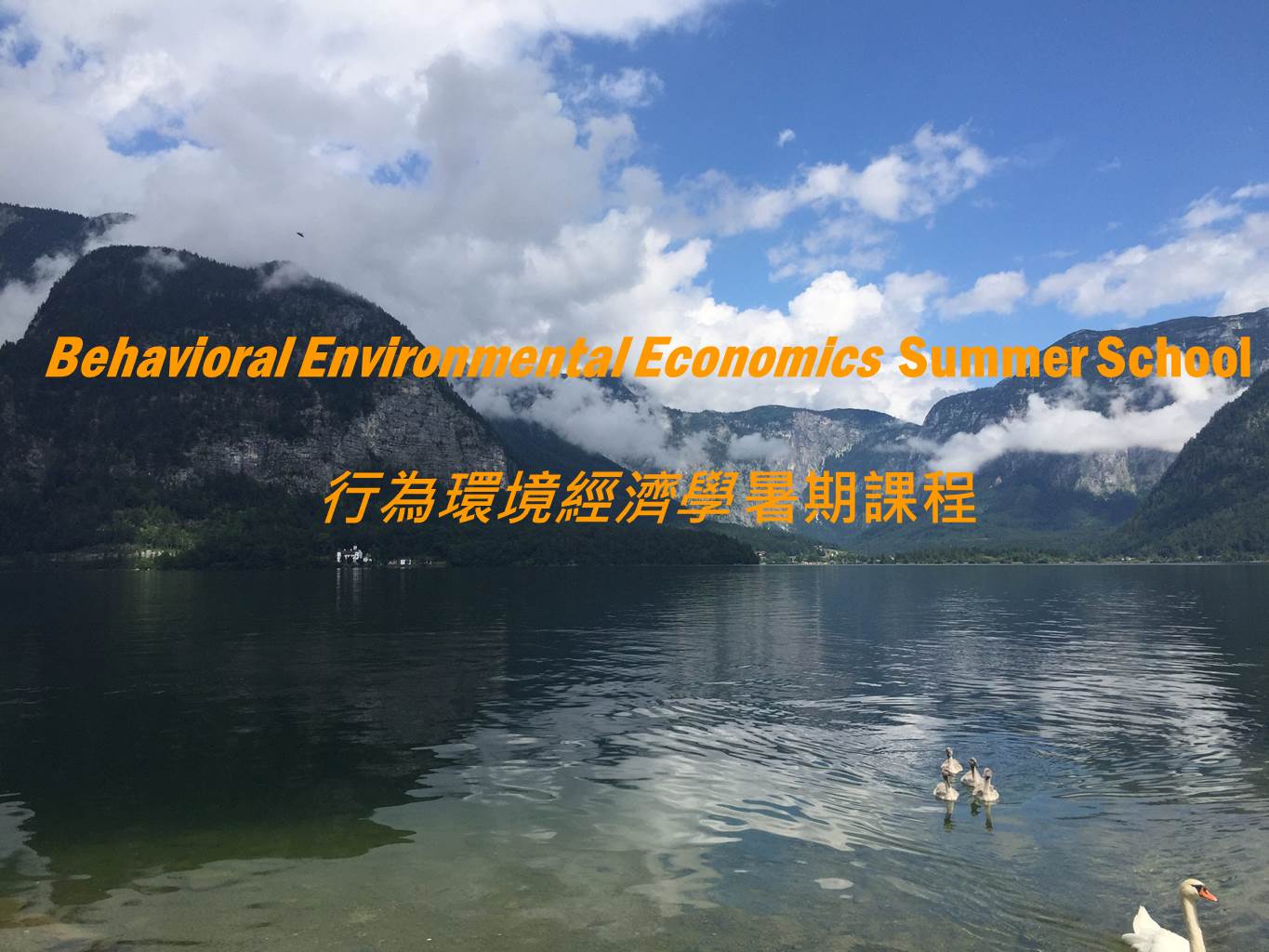
主辦單位 Organizers:
台灣環境與資源經濟學會
Taiwan Association of Environmental and Resource Economics
中央研究院經濟研究所
Institute of Economics, Academia Sinica
國立臺北大學全球變遷與永續科學研究中心
Center for Global Change and Sustainability Science, National Taipei University
行政院原子能委員會核能研究所
Institute of Nuclear Energy Research, Atomic Energy Council, Executive Yuan
課程日期 Date:
2018年8月30日至31日(August 30-31, 2018)
地點 Place:
中央研究院經濟研究所,台北市南港區研究院路二段128號
Institute of Economics, Acdemia Sinica
台灣環境與資源經濟學會、中央研究院經濟研究所、國立臺北大學全球變遷與用續科學研究中心和行政院原子能委員會核能研究所將在2018年暑期提供「行為環境經濟學」的課程,適合對行為經濟學及環境與資源經濟學有興趣的學生、研究人員和專業人士。
課程內容:
環境經濟學的規範性分析通常對環境問題提出以經濟效率和本益分析為規範標準的政策方案。但事實上,環境經濟學家所推薦的標準政策工具,例如污染稅、碳稅、能源稅,常常不受大眾歡迎;積極對抗全球暖化的排碳管制方案也常受冷遇;一般人對許多環境風險的評估也常和「客觀的」風險指標有所差距。這些分歧雖然一部分可由個人利益與社會集體利益之間的不一致來解釋,或是部分歸因於社會大眾對「效率性」政策之所得重分配效果的憂慮,但現代行為經濟學已提出大量的證據,顯示個人的偏好可能不像標準經濟理論所定義的那般狹隘。而這些關於人性的新發現和新理解,可能對環境政策的設計產生深刻的影響。因此,台灣環境與資源經濟學會和中央研究院經濟研究所舉辦2018年的暑期課程「行為環境經濟學」,其目標是,為參與者提供行為經濟學的全面性概覽及其在環境課題方面的應用。
2018年暑期課程的主題包括:
- 行為經濟學和環境課題的關係概覽:行為經濟學在環境課題與環境政策方面的應用,特別是觀察到的行為和標準經濟理論之間的不相容性。例如,看重「沉沒成本」的謬誤(sunk cost fallacy),偏愛現狀的傾向(status quo bias),起始訊息的錨定效應(anchoring),可替代性和心理帳戶(fungibility and mental accounting)。
- 仰賴參考架構的偏好型態:「非標準型偏好」的證據與「非標準型偏好」對環境評價的影響。例如,損失規避的傾向(loss aversion),「最高願付價值」(Willingness-to-Pay)和「最低報償要求」(Willingness-to-Accept)之間的差距。並討論這類偏好型態的政策含義。
- 從行為理論來看跨期選擇:例如,指數折現和雙曲折現(exponential and hyperbolic discounting),偏好當下的傾向(present bias)和承諾機制(commitment devices),參考架構的依賴與折現問題。
- 公平意識和社會偏好:例如,利他行為,信賴與互惠,社會文化規範,以及有關這些問題的實證發現和政策含義。
- 未來的可能發展:行為觀察證據的潛在角色和局限性;政策設計課題;行為環境經濟學的未來可能研究重點和方向。
The Taiwan Association of Environmental and Resource Economics (TAERE) and the Institute of Economics, Academia Sinica and the Center for Global Change and Sustainability Science, National Taipei University and Institute of Nuclear Energy Research, Atomic Energy Council, Executive Yuan are pleased to announce the first TAERE Summer School in Environmental and Resource Economics for students, researchers and professionals.
The School will take place from August 30 to 31 at the Institute of Economics, Academia Sinica in Taipei, Taiwan. The main theme covered by the 2018 Summer School is Behavioral Environmental Economics.
Normative environmental analyses based on the efficiency and cost-benefit criterion at times implied unambiguous policy treatments of environmental problems. However, standard policy instruments such as the Pigovian tax recommended by the environmental and public economists were often unpopular. Aggressive policy actions against climate change also often met with a cold acceptance. Citizens’ assessment of the riskiness of many environmental issues also diverged from many “objective” risk measures for them. While some of these divergences could be explained by the disparity between the individual interest and the collective social interest, or by concerns about the potential re-distributional effects of some “efficient” policies, modern behavioral economics has found abundant evidence that individuals’ preferences may not be so narrowly defined as in the standard economic theory. And these findings about human nature could have profound implications on the design of environmental policies. The aim of TAERE 2018 Summer School is to provide participants with a comprehensive picture of behavioral economics applied to the environmental issues and the basic toolkit required to conduct relevant researches. Therefore, the topics of the 2018 Summer School include:
- Behavioral economics and the environmental issues: Overview of the current and potential role of behavioral findings in environmental economics and policy, with specific reference to the incompatibility between the predictions of the standard economic theory and observed behaviors (e.g., sunk cost fallacy, status quo bias, anchoring, fungibility and mental accounting).
- Reference dependent preferences: Environmental valuations and the empirical evidence of “nonstandard” preferences (e.g., reference dependent preferences like loss aversion and the observed disparities between valuations of gains and losses; disparities between the Willingness-to-Pay and the Willingness-to-Accept). Policy implications will be discussed.
- Intertemporal choice in the perspectives from the behavioral theories: Intertemporal preferences and discounting values of future outcomes (e.g., exponential and hyperbolic discounting; present bias and commitment devices; reference dependence and discounting of future gains and future losses).
- Fairness and social preferences: E.g., altruism, trust and reciprocity, and social norms; empirical findings and policy implications.
- “Where are we going?”: Potential role and limitations of behavioral findings and policy design; possible future priorities/directions for environmental behavioral economics.
講師 Instructors:
Jack L. Knetsch教授,加拿大Simon Fraser大學
Y. Eko Riyanto教授,新加坡南洋理工大學
議程暨影片 Program and Video Review:
| 08月30日(星期四)/ August 30, 2018 | |
| 時間(Time) | 議程(Program) |
| 08:30~08:50 | 報到 Registration |
| 08:50~09:00 |
|
| 09:00~12:30 |
講師/ Instructors:
|
| 12:30~14:00 | Lunch & Discussion |
| 14:00~17:30 |
講師/ Instructors:
|
| 08月31日(星期五)/ August 31, 2018 | |
| 08:40~09:00 | 報到 Registration |
| 09:00~12:30 |
講師/ Instructors:
|
| 12:30~14:00 | Lunch & Discussion |
| 14:00~17:30 |
講師/ Instructors:
|
課程讀物 Reading List:<按此前往>
